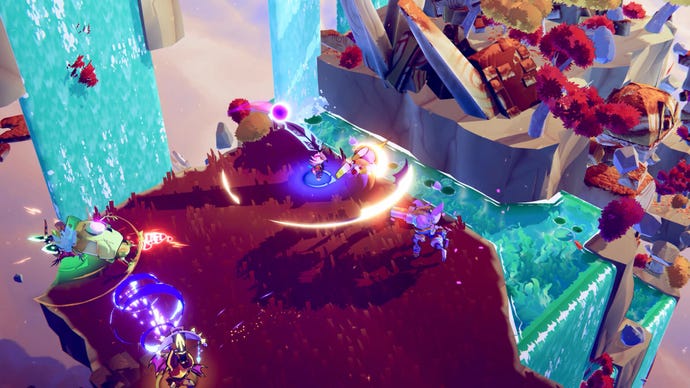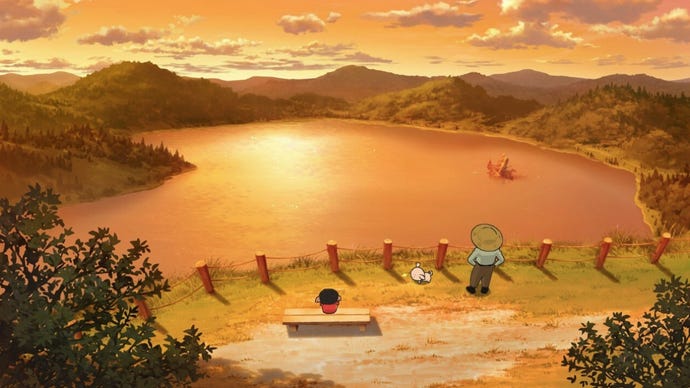Products You May Like
Unlike a lot of the team I’d imagine, my opinion is this: I thought the year was quite middling for games. Or at least, it was middling for my own personal taste, which is quite unsavoury at the best of times. Most of my best picks made it into the calendar proper, but a couple didn’t. One I hadn’t even played properly until after the vote, and the other? The other is a flawed pick, but one that I couldn’t stop thinking about.
Anyway, hope you all have a restful Xmas folks and a cracking new year. I hope Santa bought you some nice warm socks or a chocolate orange so dense, you could tee it off at your local golf club.

Windblown‘s an early access roguelike that I thought looked a bit middling when it was first revealed. Then I gave it a whirl and I was proven totally, totally wrong. It feels excellent, is smart, and you can play it alongside two friends for some frantic co-op capers. It’s a shame no-one is really talking about it, so here I am to rectify that.
As a cute animal (axolotl, bat, lizard, hamster, one I’ve forgotten), you are to jump into a big cannon and fire yourself into a huge, swirling tornado. It’s in this tornado that a sequence of increasingly difficult stages is conveniently set up, varying from mushroom kingdoms to rat towns and rusted mechas, all on floating pieces of very large rocks. You’re to battle through them, gradually getting stronger as you go. Die and you’ll return to base with some currency, which you can use to permanently improve your stats or unlock cool things for future runs.
You’ve likely heard all this roguelikeyness before, but I’d say Windblown sets itself apart with a few things. The dash is sublime – very snappy, very fast, very spammable. We likey. Combat feels punchy, encouraging you to swap between your two weapons with generous “slam the swap button” windows that let you pull off some very cool combos that apply bleed or activate special moves. Weapons? Good. Powerups? Solid. It’s all been well thought through, with music that goes a lot harder than it needs to.
And honestly, I love the fact that it’s co-op. It’s rare you get to play a roguelike like this with a pal and it manages it well. I played with Liam (RPS in peace) and we never really got caught up or confused by each other’s business. One thing I will say: looting in co-op is a bit pernickety (it’s not immediately obvious who can see who’s loot, for instance). This is a minor gripe, though, as otherwise Windblown really does feel like it’s turning into something quite special.

Right now I’m listening to “1 hour of relaxing music from Shin chan: Shiro And The Coal Town” on YouTube. It shows Shin chan, a mischievous kid fishing in a quiet stream, as his pet dog Shiro wags his tail and scratches the backs of his ears. The music is wonderful and plinky, with the backdrop all lush and green – just a slice of the beautiful countryside of Akita in north Japan. I find it really takes me back to summers I’ve had as a kid and I get all nostalgic and emotional. In all honesty, it’s not helping me write this up.
We must persevere through the emotion, though, for this is why it’s in my selection box in the first place. The machinations of Coal Town aren’t exactly for me, in that it’s a collectathon where you go about a wonderful town and collect bugs and fish and 99.9% of your quests are to do with gathering yet more materials. You do this every day (it’s not like Animal Crossing, in that time pauses when you quit the game) and it can feel like you’re ignoring all the loveliness in favour of blazing a path to fill your backpack as fast as possible.
Despite the actual playing of said game not being for me, I think it’s a wonderful space to exist in and it harbours a lovely message (even if Shin chan is a menace). Akita is presented through gorgeous, dreamy vignettes. Rice paddies lit by the sparkle of fireflies. The reflection of the stream bubbling underneath a quaint road. The rattle of the cicadas underscoring everything. Throughout the story, the townsfolk rue the young people leaving for greater opportunities in the city, as they sit in hot baths or chat on twisting mountain paths.
The overarching theme being that the Japanese countryside is being forgotten and it shouldn’t be. All marked by the fact that as you collect and gather all those materials, the ailing, forgotten town is revitalised and becomes a hub of genuine happiness and industry. The game itself is a message for the next generation, and for anyone, really: there are opportunities in the countryside, too. Those better than the spiritless deals offered by the corpos in grey cities. Those that can offer a richer life, one marked by community and crystal blue sky.
